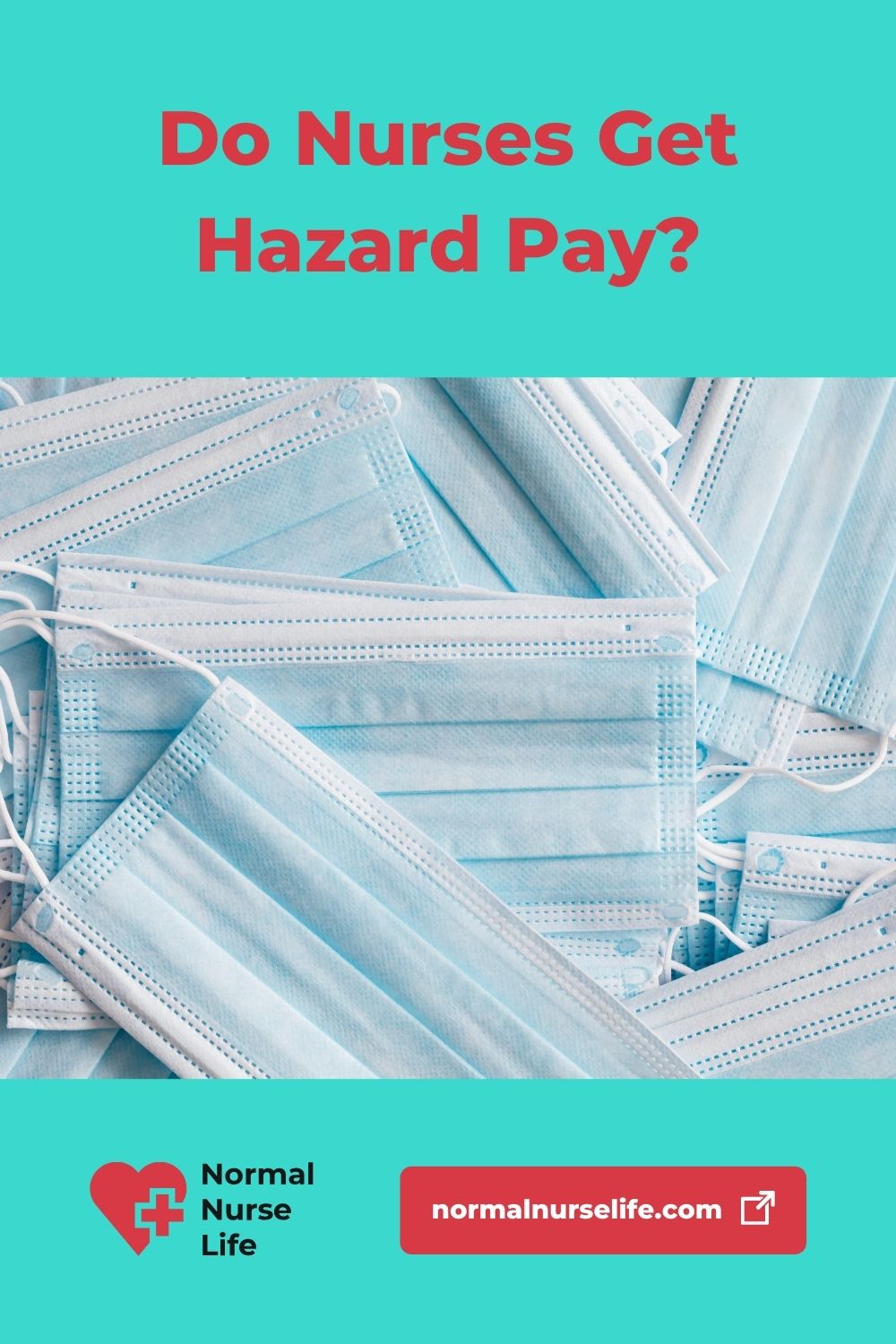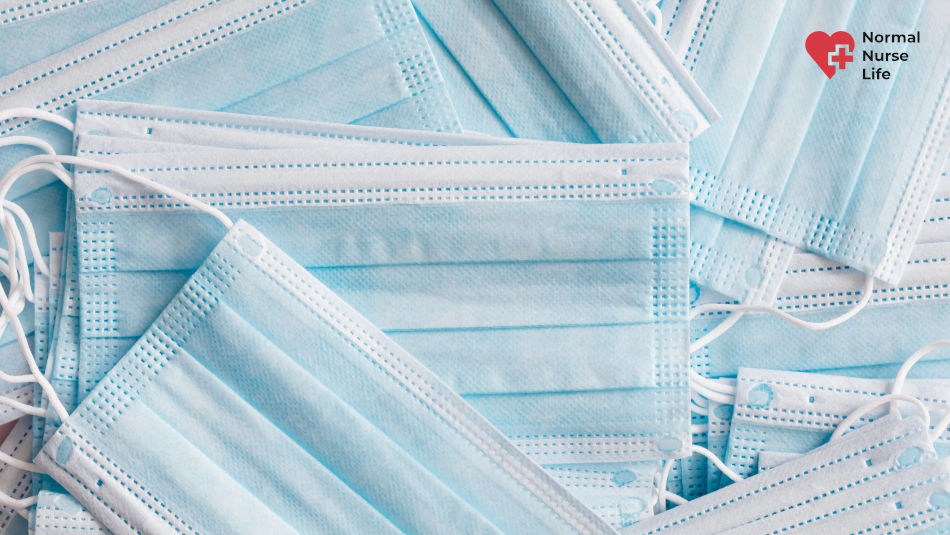As per federal law, employers should make hazard pay a special benefit for their employees.
However, hazard pay depends on the employer’s decision. There are no prevalent laws that make hazard pay a necessity.
Do nurses get hazard pay? Well, in most cases, nurses don’t get hazard pay.
To learn more about the hazard pay situations for the nurses, keep on reading.
But first, check out this video where Debra Washington, a registered nurse, gives her thoughts about hazard pay.
Pin me on Pinterest!

Table of Contents
Do all nurses get hazard pay?
Not all nurses receive hazard pay for their institutions or unions.
While some nurses that belong to a certain institution, union, or employees by organizations are increasing their financial support, most of the nurses aren’t.
According to the U.S. Department of Labor, hazard pay is a kind of extra compensation paid to the nurses who work despite danger and physical hardship.
An employer calculates the hazard pay depending on a flat fee or hourly rate.
After that, the total is added to the nurse’s regular wage or salary.
For example, every employee might be entitled to a 10% premium set by their employer under various kinds of hazardous conditions.
Hence, for all the extra hours that the employee works, they receive about 10% extra amount on top of their regular hourly pay.
But what about the workers who are working overtime in hazardous conditions.
Such worker’s pay will be calculated depending on the regular pay including a 10% premium.
Moreover, the hazard pay isn’t affected even when certain exclusions relating to the overtime pay rate apply.
In most scenarios, an employer fixes on an amount that will be payable per period.
For instance, when an employer offers to pay $300 per month as hazard pay, it means you receive the amount on top of your usual paycheck.
However, it is important to note that nurses receive hazard pay for the hours that they have worked for only under dangerous conditions.
According to the HEROES Act, nurses were entitled to receive a specific amount for all the valuable hours that they have worked.
As said, not all nurses receive hazard pay.
And, it includes registered nurses, certified nursing assistants, nurse practitioners, ER nurses, and so on.
See also: Nurse Practitioner vs Physician Assistant
Whether a person belongs to the specialized category of nurses, they may receive a lump sum representing hazard pay only if the employer or union agrees.
See also: Nursing Chain of Command
To most people, hazard pay is an important facility that should be given to nurses regardless of whatever category they are from.
Nurses serve as frontlines whenever there is an emergency.
See also: Are Nurses First Responders?
Moreover, they are putting themselves at risk alongside their children and parents.
Many supporters of hazard pay to nurses believe that it could lift their spirits and sustain their motivation.
As a result, it will save more lives.
Also, it supports their valuable skills to people who need them the most.
However, there are valid arguments that go against the nurses.
Some people, even nurses believe that they are not only the ones that face danger.
Nursing itself is a dangerous profession and they know about their role from the first day.
They are well aware of the risks that they are going on. Moreover, nurses are well paid and this is why many employers refuse to pay anything extra.
See also: Do Nurses Make Good Money?
Hazard pay for nurses increases the government debt to a great extent. And, in the end, the country might be dragged into a deep burden.
Nurses earn relatively better compared to other essential workers.
Also, a sense of duty should be there to drive nurses. If they can’t stand by their sense of duty and need a monetary incentive, they should look for other work.
See also: Why Nurses Leave the Bedside?
Do nursing home employees get hazard pay?
Apart from low pay, nursing home employees don’t get hazard pay.
Most of the time the nursing home employees go on a strike in an attempt to bring the concerned department to their attention and needs.
There is no shortage of emergencies in nursing homes and the problem becomes worse whenever there is an epidemic.
Moreover, most nursing home workers are in constant fear of whether they might carry the germs of some kind of contagious disease to their family members.
Other than low paychecks and lack of hazard pay, the nursing home workers have few opportunities required for professional development and no benefits.
Moreover, in cases of an epidemic, they are even forced to work for longer hours than normal.
See also: Why Do Nurses Work 12 Hour Shifts?
It is important to understand that nursing home employees are putting their valuable life on the line whenever an emergency strikes.
And, during emergencies, nurses are more exposed to physical hardships and hazardous duties.
In many nursing homes, regardless of whether a nurse is having a low or high wage, there is no provision for hazard pay.
There is no question that over half of the total nursing home employees are deprived of hazard pay.
They believe that the nursing home management fell short of delivering enough when it comes to hazard pay.
While most of the employees across different settings have reported feeling burned out, nursing home workers led the way with 56%.
That being said, the saddest part is that nursing home staff encounter sickness and death while treating patients during an epidemic.
While many leaders at leading nursing home facilities have indicated that different pathways needed for advancement are necessary to attract and sustain the frontline talent.
Many certified nursing assistants believe that they are on the right path in terms of their career, excluding the material needs to provide for their families.
Most of the nursing home workers all over the country have been a victim of low pay grade and hazard pay.
While some of their legitimate demands bear fruit when they go on a strike, most of the time they don’t become successful.
However, some nursing home employees are entitled to receive hazard pay.
During emergencies or epidemics, certain medical facilities provide hazard pay to their employees.
Hazard pay comes in different formats as suited by the employer.
Some of them might provide an additional amount of money per week, or some include them with the monthly paycheck.
Are healthcare workers getting hazard pay?
Sadly, healthcare workers are underpaid, unsung, and unseen for all their hard work, especially during an epidemic.
Their jobs demand more and put them at risk of getting severe diseases whenever there is any kind of emergency.
Again, not every healthcare worker receives hazard pay.
That’s because the concerned medical facility is the one responsible when it comes to providing hazard pay to their employees during emergencies.
Moreover, it doesn’t depend on whether the medical facility is big or small.
It is often seen that a small healthcare facility gives their workers’ hazard pay, whereas the opposite thing happens in a bigger setup.
In general, hazard pay is given to the healthcare workers in the form of one-time payment that can start from $1500 and above depending on the decision taken by the concerned authority of that medical facility or a union.
On rare occasions, the organization might increase the pay of the healthcare staff.
The majority of healthcare workers are women.
So, they have to work hard during emergencies.
A boost in pay makes them stay motivated and deliver the best of their services.
Moreover, during an epidemic, the mental condition of the healthcare workers doesn’t remain normal compared to ordinary days.
They are in constant fear of whether they might be contaminated by the germs.
In short, they have to work efficiently and carefully.
The hazard pay acknowledges their dedication toward the work they do and the risks associated with them because of the exposure.
It is a great way to show appreciation for the healthcare workers when patients prompt service.
See also: Can Nurses Accept Tips?
Home healthcare workers, in particular, take care of elderly people and those who are suffering from disability issues.
See also: Home Health Nurse Interview Questions
They work hard to give the best of their services to make the people get relieved from their suffering.
Hazard pay is the only way to show appreciation for their work.
And, this is why many institutions and organizations have agreed to provide hazard pay to their valued workers.
However, the picture is different for employees under the municipal corporation.
Many municipal healthcare workers are demanding hazard pay.
If such a situation arises, the authorities have to seek help from the state or federal level to provides healthcare workers with hazard pay.
Moreover, there are hundreds of examples where healthcare workers received hazard pay after going out on strike.
Sometimes, the political conditions play a significant role in whether the healthcare workers might receive hazard pay or not.
Local healthcare workers often complain that outside workers receive payment as much as three times compared to them.
It is beyond doubt that healthcare workers need support and receiving hazard pay is the best way to compensate for their hard work.
Conclusion: Do nurses get hazard pay?
So, it is clear that most medical facilities provide nurses and healthcare workers with almost everything that they should get.
And, they get hazard pay as well.
However, this is not the case with all healthcare workers.
Also, it can be hoped that everyone should get hazard pay during an epidemic so that it can lift their spirits high and deliver their best of services.
At this point, you should know whether do nurses get hazard pay or not.
Related articles of ours:
- Do Nurses Get Pensions?
- Do Nurses Get Paid Overtime?
- Do Nurses Get Health Insurance?
- Do Nurses Take an Oath?
Give this article a star rating down below. Thank you in advance!
